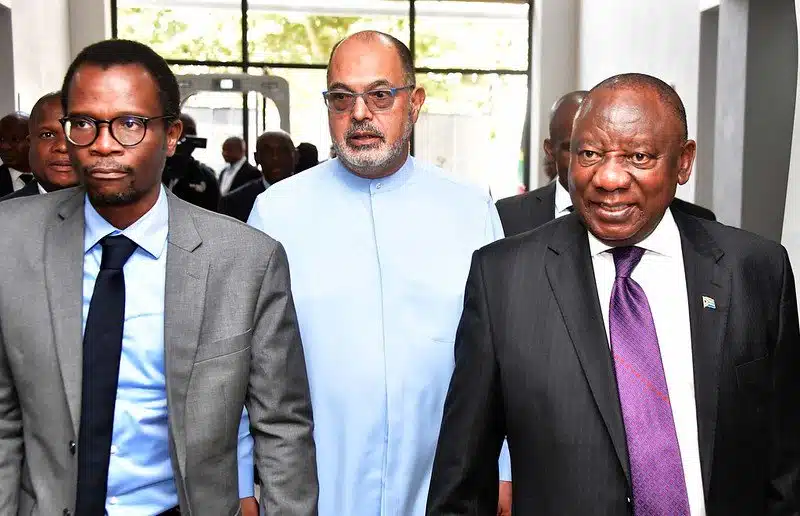
4 big tax changes coming to South Africa
Parliament has been in the exhaustive process of passing both money and member bills that deal specifically with the taxation of South African businesses and people.
Many of the critical bills put forward have undergone the public consultation processes and are entering the later stages of their creation. The bills, in particular, deal with the new proposed two-pot retirement system, alcohol and vape taxes, customs duties as well as personal income tax.
Being very technical in nature, the National Treasury, alongside the South African Revenue Service (SARS), briefed Parliament on the draft Taxation Laws Amendment Bill (TLAB), Tax Administration Laws Amendment Bill (TALAB), the Revenue Laws Amendment Bill and the new Rates Bill, in a standing committee on finance (18 October).
Legal experts anticipate that the TLAB and TALAB are to be tabled on the same date as finance minister Enoch Godongwana’s medium-term budget policy statement on 26 October.
Revenue Laws Amendment Bill
The bill contains proposed amendments to the Income Tax Act dealing with the two-pot retirement system. The new two-pot system aims to offer South Africans more flexibility when it comes to their retirement fund systems.
The idea is to divide contributions to all retirement savings into two separate pots. In reality, though, members in more established retirement funds will have three pots:
- The vested pot (amounts accumulated before the implementation date);
- 1/3 accessible savings pot and;
- 2/3 retirement pot is subject to full preservation until retirement (contributions after 1 March 2023 that have to be preserved until the retirement date).
After consultation with the public, according to legal specialist Joon Chong from Webber Wentzel, the Treasury said that it has proposed to clarify and amend the broader policy issues raised by businesses.
As a result, the implementation date of the new retirement system has been postponed from 1 March 2023 to 1 March 2024, and it is now a requirement that members contribute one-third to the savings pot and do not have the ability to contribute less.
Other changes in the pipeline for the two-pot system include a minimum withdrawal amount of R2,000 per rolling 12-mon period being changed to gross, not net.
Treasury and SARS make changes to South Africa’s ‘two-pot’ retirement proposals
Rates Bill
Building on tax announcements made in the 2022 budget speech, this bill deals with changes in rates and monetary thresholds for the personal income tax tables, as well as increases of the excise duties on alcohol and tobacco, said SARS.
“It also contained changes tabled by the Minister in Parliament on 31 March 022 and 31 May 022 regarding temporary relief on the fuel levy as well as the postponement of the effective date of an increase in the health promotion levy.”
After consultation, especially with figureheads such as the Beer Association of South Africa, the price hike on beer beverages by 11 cents is being reconsidered.
This comes after the Treasury and SARS considered the fact that beer and other alcoholic goods that have lower levels of alcohol by volume (ABV) should be taxed proportionally lower than products with higher ABV.
Under the rates bill, the Treasury proposed an average excise rate for e-cigarettes at R2.91 per millilitre and apportioned in a ratio of 70:30 between nicotine and non-nicotine elements.
In terms of customs and excises on ‘sin tax’ products, the Treasury said that it has a guideline to direct excise policy 11,23 and 36% of the weighted average retail price of wine, beer and spirits – and 40% of the price of the most popular brand for cigarettes.
“In 2022, the government proposes excise duty changes of between 4.5% and 6.5%.”
Taxation Laws Amendment Bill
The draft TLAB is a wide stretching bill that aims to amend provisions relating to income tax, customs and more.
The bill aims to amend section 7B of the Income Tax Act that currently makes special dispensation for variable remuneration and makes provision for the deferral of the taxation of variable remuneration to the date when the amount is received as opposed to when it accuses the worker.
Summarily, the new amendment wants to ensure that people who rely on periodic or performance-based income payments are also subject to more stringent tax compliance requirements. Consultation with the public brought to the forefront that it is not just informal workers who may be paid periodically but also formal sector employees.
The TLAB also contains proposals to tax the retirement interests of individuals who cease their tax residency in South Africa. Public consultation revealed significant gaps in legislation that could allow for abusive or doubling-up tax benefits.
The TLAB contains a proposal to tax the retirement interests of individuals upon cessation of their South African tax residency.
The changes to the carbon tax were one of the most contentious proposals made by the government. Business leaders from the energy council, mining industry, and more recently, gave advice on how to “prevent just transition impacts earlier than expected and to avoid unintended or bad implications to an already fragile economy.”
After consultation, SARS, alongside the National Treasury, said that it would reconsider the pricing and periodical increase of the carbon tax. To ensure that it is affordable, the authorities said that they would look into passing the carbon tax rate on the US dollar average as provided by the South African Reserve Bank (SARB).
Tax Administration Laws Amendment Bill
This bill will enable the other pieces of legislation to make the necessary changes as well as outline and deal with the procedural elements behind each law change, namely those affecting the following:
- Income Tax Act, 1962
- Customs and Excise Act, 1964
- Value-Added Tax Act, 1991
- Securities Transfer Tax Act, 2007
- Tax Administration Act, 2011
- Customs Control Act, 2014
The National Treasury and SARS said that they had limited the scope of powers for certain officials to enact provisions under the above tax bills. For example, in regard to accessing suspicious activities by SARS, the process is now limited to only senior officials.



